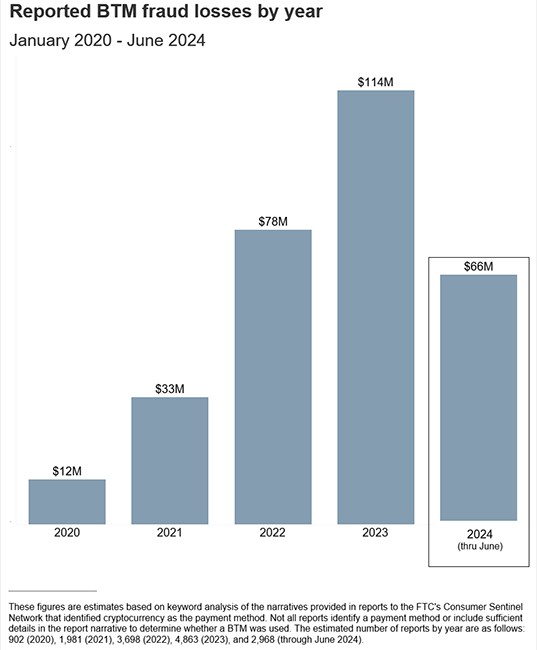The United States Federal Trade Commission (FTC) is warning consumers of a "massive" surge in Bitcoin ATM scams (add it to the list of
cryptocurrency scams). According to the FTC, consumers posted collective losses totaling $110 million in 2023, which is a tenfold increase versus 2020. And in the first half of this year, losses topped $65 million, which could be "only a fraction of the actual harm." That's because "the vast majority of frauds are not report," the FTC says.
Most commonly, you'll find Bitcoin ATMs in places like convenience stores, gas stations, and other high-traffic areas. They look like regular ATMs, but instead of doling out cash, they accept cash and exchange it for cryptocurrency. These machines can make investing in Bitcoin quick and easy, but they're also being targeted by scammers.
"Widespread access to BTMs has helped make this possible. Reports of losses using BTMs are overwhelmingly about government impersonation, business impersonation, and tech support scams.[7] And when people used BTMs, their reported losses are exceptionally high. In the first six months of 2024, the median loss people reported was $10,000," the FTC says.
People who are 60-years-old or older are more than three times as likely to fall for a Bitcoin ATM scam. The machines themselves are legitimate, but how the scam typically works is a potential victim receives a call or message claiming there's been suspicious activity or unauthorized charges on their account.
"Others get your attention with a fake security warning on your computer, often impersonating a company like Microsoft or Apple. These things are hard to ignore, and that’s the point. From there, the story quickly escalates," the FTC adds.
In some cases, the scammer will put a fake government employee on the line, even claiming to be from the FTC. Once the scammer has created a sense of urgency with the victim, the swindling begins in earnest. They'll text the victim a QR code to scan at the machine, and—you guessed it—it links to the scammer's digital wallet. Any cash deposited using the QR code ends up in the hands of the scammer.
There's obviously a social engineering element to this scam, which relates closely to phishing. One of the FTC's suggestions is simply to "slow down," noting that scammers try to rush their victims.
The
FTC also advises consumers to never click on links or respond directly to unexpected messages, refrain from withdrawing cash in response to an unexpected call or message, and never believe anyone who directs you to use a Bitcoin ATM (or buy gift cards or otherwise move month to fix a problem).

